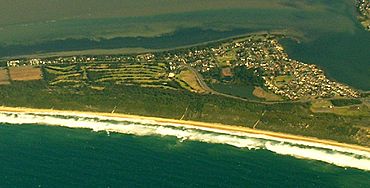Primbee, New South Wales facts for kids
Quick facts for kids PrimbeeWollongong, New South Wales |
|||||||||||||||
|---|---|---|---|---|---|---|---|---|---|---|---|---|---|---|---|

Aerial view from east
|
|||||||||||||||
| Population | 1,640 (2016 census) | ||||||||||||||
| Postcode(s) | 2502 | ||||||||||||||
| Elevation | 6 m (20 ft) | ||||||||||||||
| Location |
|
||||||||||||||
| LGA(s) | City of Wollongong | ||||||||||||||
| State electorate(s) | Wollongong | ||||||||||||||
| Federal Division(s) | Whitlam | ||||||||||||||
|
|||||||||||||||
Primbee is a small town, called a suburb, located in Wollongong, New South Wales, Australia. It sits on the northern part of the Windang Peninsula. This peninsula is a strip of land that separates Lake Illawarra from the big Pacific Ocean. Primbee is near other places like Windang and Warrawong in the Illawarra region.
Long ago, Primbee was known as "The Lake Suburb." It was later officially named Primbee. Some people still call it "The Upper Peninsula" or "The Upper Island." This is because of an old story. The story says there used to be another way into Lake Illawarra. This entrance was between Primbee and the Kemblawarra Industrial Park.
History of Primbee
The exact reason for the name Primbee is not fully known. In the 1860s, farms in this area were owned by James Stewart, David James, and Thomas Griffin. An old map from 1893 shows a part of the bay near Purry Burry Point as Primbee Bay.
How Primbee Got Its Name
In 1919, the land in the area was divided into smaller pieces. These pieces were then put up for sale. At that time, the area was not called Primbee. It was still known as "The Lake Suburb."
One person who lived there in the 1920s shared a memory. They said, "I came to Primbee in 1920... My parents were among the first to buy land. It was called Lake Suburb Estate back then. I don't know how it came to be called Primbee. No one here was asked or told. It just happened."
Primbee Public School
The local public school in Primbee was opened in 1938. It is called Primbee Public School. In 2011, the school had 80 students. These students were in classes from Kindergarten all the way to Year 6.
 | James Van Der Zee |
 | Alma Thomas |
 | Ellis Wilson |
 | Margaret Taylor-Burroughs |


